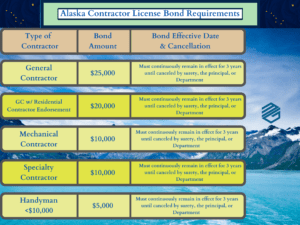Most contractors in Alaska need a valid contractor license and a valid Alaska Contractor License Bond to legally operate in the state. The license bond protects the public by ensuring that the contractor will perform their obligations and operate according to state and local laws. Specifically, Alaska requires the Contractor License Bond to protect the following payments:
- Taxes and contributions due the state and political subdivisions.
- Persons furnishing labor or material or renting or supplying equipment to the applicant.
- Amounts that may be adjudged against the applicant by reason of negligent or improper work or breach of contract in the conduct of the contracting business or home inspection activity, as applicable, or by reason of damage to public facilities occurring in the course of a construction project.
If a contractor does satisfy these obligations, a person can make a claim against the license bond. The surety bond company will then investigate the claim and pay out on valid claims. It is important to understand that these license bonds are not insurance and the surety bond company will seek reimbursement for any amounts they must pay out. This is known as the Principle of Indemnity, although claims on these license bonds are rare.
Which Alaskan Contractors Need a License Bond?
Almost all contractors performing work for others in the state need to be licensed and have a valid contractor license bond. You can read the full requirements of the state here. The state provides some quick guidance to help contractors decide if they need to be bonded and licensed. If a contractor answers yes to any of these bullet points, they probably need a contractor license bond and license:
• The name of the business, the business’ signage or even advertising indicates to the public that you are in construction.
• The contractor plans to submit bids as a contractor
• You perform work for a contractor
• You work as a subcontractor
• You subcontract work to others
• You perform mechanical installation, repairs, or maintenance
• You perform electrical installation, repairs, or maintenance
As you can see, this applies to virtually everyone involved in the construction performed for others. Contractors who are not sure should contact the state directly.
What Is the Required Bond Amount?
This depends on what type of trade is being performed. The state has different classifications for these license bonds. These include General Contractor, General Contractor with a Residential Contractor Endorsement, Mechanical Contractor, Specialty Contractor and Handyman (or those with projects less than $10,000). The chart below shows contractors the amount of bond required for each trade and how long the bond needs to remain in effect:
As the chart shows the required license bond amount for a General Contractor is $25,000, and a General Contractor with a Residential Endorsement is $20,000. A Mechanical Contractor’s and Specialty Contractor’s license bond needs to be in the amount of $10,000. Finally, a Handyman will need a license bond in the amount of $5,000.
The surety bond company does not have to pay more than the bond amount. If claims exceed the amount of the license bond, Alaska requires payments to be made in the following order:
1. Labor, including employee benefits
2. Taxes and contributions due the state, city, and borough, in that order
3. Material and equipment
4. Claims for breach of contract
5. Repair of public facilities
Term of the Alaska Contractors License Bond
As you can see by the table above, Alaska is different than many states in that it requires the license bond to be continuous for three years unless cancelled by the Principal, Surety Bond Company, or the State.
How to Get an Alaska Contractor License Bond?
These license bonds are easily obtainable with a competed application and a credit check. Usually we have can have an approval and license bond issued in a matter of minutes for most contractors. Contractors should be ready to provide the following information:
• Name and Address of the Owner(s)
• Name of Spouse(s)
• Ownership Percentages
• Name and Address of the Business
• License Number
• FEIN
• Contact Information
• The Desired Term of the Bond. This can be a single year or multiple years.
What is the Cost of an Alaska Contractor License Bond?
The cost depends on the credit of the Owner and the length of time the company has been in business. Preferred pricing for the $25,000 General Contractor bond starts at about $450 a year while standard pricing is about $1,000. For the $10,000 Specialty Contractor Bond, Mechanical Contractor Bond and Home Inspector Bond, pricing is about $200 for most contractors. We can even issue these bonds without a credit check in many circumstances. The Handyman Contractor Bond is $100 per year. Most Surety Bond companies give discounts to contractors who purchase multiple years up front. For example, a two year Specialty Contractor Bond is around $350 instead of $200 for one year.
What About New Contractors or Contractors with Bad Credit?
We can still assist both newly licensed contractors and contractors who may have imperfect credit situations. MG Surety has programs to obtain these bond with no credit checks so contractors of all credit situations can apply.
Other Surety Bonds May Be Required for Contractors
Getting an Alaska Contractors License Bond is required to legally operate as a contractor in Alaska. However, many other surety bonds may be required to perform construction work in Alaska. These include Bid Bonds, Performance Bonds, Payment Bonds, Maintenance Bonds and potentially others. These contract surety bonds are project specific and have different underwriting requirements and costs.
Alternatives to Alaska Contractor License Bonds
The state of Alaska does allow contractors to post alternatives instead of a surety bond. These alternatives must be in the same amounts required by surety bonds. These alternatives include:
• Certificates of Deposit issued by a bank or trust company authorized to do business in the State of Alaska.
• Cash Deposits held in trust by the state.
• Others on a case by case basis.
Contractors should consider the opportunity costs of posting cash or certificate of deposits. These resources will be tied up with the state for a period of three years and those are assets that the contractor could be using for its business. On the other hand, license bonds allow contractors to use those assets in the operation of their businesses. Additionally, surety bond companies have to investigate claims to make sure they are valid. There are no such requirements with cash and certificates of deposits.
Other Considerations for Alaska Contractor License Bonds
The state does allow contractors to switch from one classification to another. For example, a specialty contractor could decide that they want to be a general contractor. However, they must apply to the state to do this. Posting a new license bond for the new classification is also part of the requirement.
Penalties for Not Having the Required License Bond
Contractors can face serious penalties for not having the required Alaska Contractor License Bonds. According to state documents, “If a contractor’s bonding or insurance has been cancelled, reduced by judgment, or is no longer in effect for any reason, and it is not reinstated within 20 days after the department gives the contractor a written warning, the department will, in its discretion, give the contractor written notice under AS 08.18.121(f) prohibiting further action as a contractor until submission of evidence acceptable to the department showing that the violation of the bonding or insurance requirements AS 08.18.071 or AS 08.18.101 has been corrected.” It goes on to say,
“the contractor shall immediately stop all work as a contractor. The possible consequences of failure to stop all work include citation under AS 08.18.117, injunction and civil penalty under AS 08.18.131, and criminal prosecution under AS 08.18.141. (b) In addition to a deactivation notice under AS 08.18.121(f) and (a) of this section, the department will, in its discretion, under AS 08.18.121(a)—(e), institute proceedings to revoke or suspend the registration of a contractor whose bonding or insurance required by AS 08.18.071 and AS 08.18.101 is no longer in effect. The department will also, in its discretion, deny the renewal of the contractor’s registration. Revocation, suspension, and denial of renewal of contractor’s registration are covered by Administrative Procedure Act (AS 44.62). The department will also, in its discretion, issue a cease and desist order under AS 08.01.087(b)(1), issue a citation under AS 08.18.117, institute an action for an injunction under AS 08.18.131, seek criminal prosecution under AS 08.18.141, deny renewal of registration, or any combination of these actions.”
Contractors should not risk the penalty of not having a valid Alaska Contractor License Bond. They are easy to obtain and affordable. MG Surety Bonds works with 25+ surety bond companies and will work to get contractors the best pricing and terms available. Contact us anytime or you can visit our Frequently Asked Questions Page about surety bonds. We are surety bond experts and work with contractors in all circumstances.


